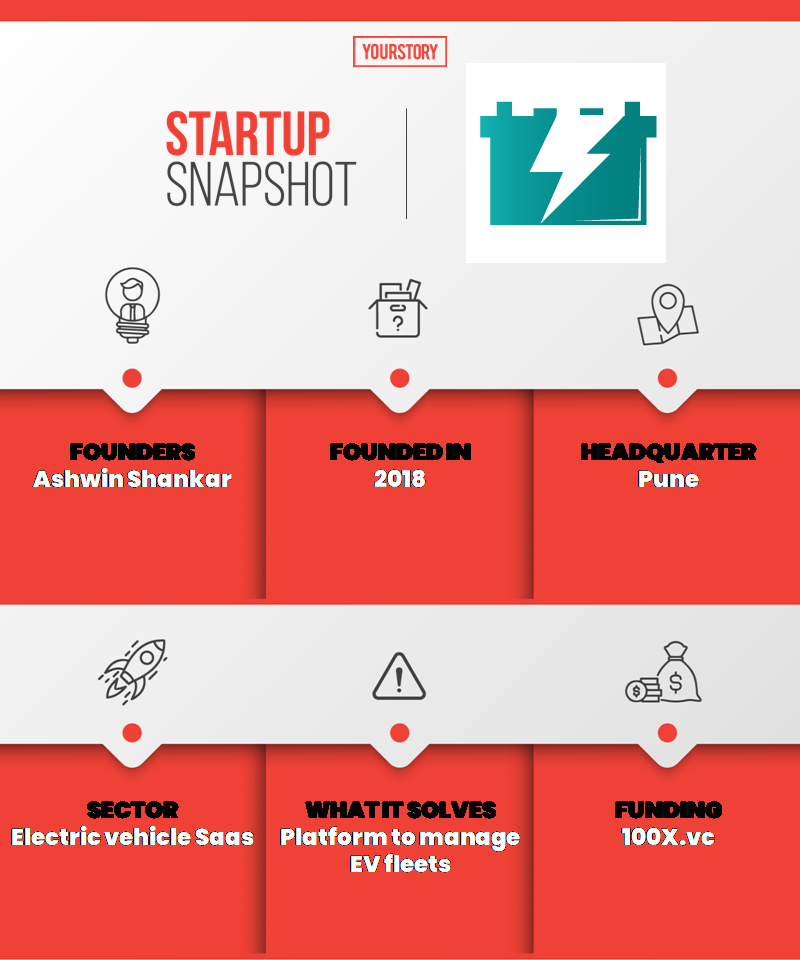The Electric Vehicle (EV) segment in India has gathered momentum in recent years, and the number of startups either manufacturing or using EVs has increased. Although the adoption of EVs in the consumer segment is slow in our country, it is a different story in the B2B segment. Ride-hailing companies, food delivery companies, and ecommerce companies have made big plans to own and lease large fleets of electric vehicles in the coming days.
However, the on-ground adoption of EVs seems to be complex. Any company with EVs has to plan its routes, battery maintenance, and return on investment on the infrastructure. This is where BatteryPool comes in.
Founded by Ashwin Shankar in 2018, the Pune-based startup’s tech stack provides real-time, actionable insights to fleet operators to eliminate operational challenges in running EVs and improve utilisation of the vehicles.
“Running EVs in fleet applications can lead to downtime and operational challenges due to the range of the vehicles and lack of an ecosystem to support EVs for charging and maintenance,” says Ashwin.

BatteryPool snapshot
The early days
An electrical engineer, Ashwin graduated from Purdue University in 2012, and later from Stanford University in Electrical Engineering in 2018. He moved back to India and spent a year working at a technology policy think tank where he was exploring technology and innovation in the automotive industry.
Ashwin says, during this time the government was talking about going all-electric by 2030. “The sector aligned with my background and my skillsets, and I decided to start up in this industry,” he says.
To understand the challenges faced by fleet operators while using EVs, the founder bought a fleet of 20 EVs and two-wheelers and deployed them with small businesses and delivery boys in Pune. This was in 2018.
“We ran this fleet for a year and saw the problems faced in running EVs first hand - everything from vehicles running out of charge in the middle of deliveries to drivers not being able to locate charge points when they wanted to recharge their battery packs to vehicle breakdowns that could not be addressed by neighborhood mechanics,” says Ashwin.
It was clear that while EVs made sense commercially, issues around battery charging and maintenance can lead to downtime of these vehicles when they are used in fleet use cases.
Being engineers, the five-member founding team built tech internally to address these operational issues. Around June 2020, the founder realised this tech can be useful for those who deploy EVs, and this became a great opportunity for BatteryPool.
The rise of EVs
The EV ecosystem in India is still nascent but evolving quickly. Startups like Ather, Tork, Revolt, and traditional OEMs like Bajaj and TVS manufacture EVs for personal as well as fleet use cases.
Fleet operators in shared mobility and last-mile delivery realise the commercial benefits of using EVs and have now started to deploy them in their fleets. Companies like Flipkart, Amazon, and Bigbasket have clear roadmaps to convert their delivery fleets to 100 percent electric within the next few years.
At the same time, India is witnessing friendly policy and government support to adopt EVs in the country. FAME-II (provided by the central government) provides incentives that help bring down the upfront cost of EVs. Even state governments have schemes that provide further incentives, road tax and registration fee waivers for the purchase of EVs.
The solution
BatteryPool offers SaaS plus hardware solutions that allow fleets to deploy and manage electric vehicles. The stack comprises battery-swapping station hardware, vehicle telematics unit, and a modular SaaS platform that provides real-time, actionable insights into the electric vehicle charging, maintenance, and operations.
Fleet operators can attach the telematics unit to their EVs and use the SaaS platform to manage their EV fleet operators. In addition to this, fleet operators can set up battery swapping stations at their locations and enable their riders to exchange battery packs without having to wait for a recharge.
The startup has invested Rs 20 lakh and has raised Rs 25 lakh via grants and an angel round along with the 100X.VC investment.

Ashwin Shankar of Battery Pool
The business model
Fleets that work with BatteryPool buy the hardware (i.e., battery swapping station) for an upfront price and the startup also has a monthly subscription price.
“We intend on entering markets in Europe and America soon and foresee a challenge with a more mature EV ecosystem and competing products in those geographies,” says Ashwin.
The startup aims to help operators deploy over 2000 EVs on the BatteryPool platform and build partnerships with five-plus OEMs for the integration of the platform with their vehicles over the next 18 months.
Programmes run by the Department of Science and Technology (DST), Govt of India, and NCL Innovation park incubator in Pune, have helped the startup in showcasing its technology.
“We have five fleets that are using our solutions. In parallel to this, we are looking to partner with vehicle OEMs so that we can approach fleets together. We have realised that the first point of contact when fleets transition to EVs happen to be the OEMs. So, we believe that such partnerships can help us get to our end customer much faster,” says Ashwin.
The startup’s tech stack is comprehensive - it is a one-stop-shop for all things a fleet operator would need to deploy and manage EVs in the fleet. The solutions in the stack are offered in a modular fashion, which means as fleet operators’ business and operational models evolve, they can choose only the modules they need at that point in time. Using BatteryPool's tech stack fleets can immediately realise the cost benefits of using EVs in their fleets, while completely eliminating the downtime associated with operating them.
As of now, the startup has a total of 100 plus EV fleet across five fleet operators that are using the platform, and hopes to double the number of customers in 2021.
According to a report by Avendus Capital, Electric Vehicles (EVs) in India could represent an $8 billion opportunity by 2025. Considering that every industry spends at least three percent of their revenues on technology, the EV SaaS industry in India could be a $200 million opportunity.
Edited by Megha Reddy
Link : https://yourstory.com/2021/01/saas-startup-electric-vehicle-fleet-management-pune-ev
Author :- Vishal Krishna ( )
January 05, 2021 at 05:45AM
YourStory


